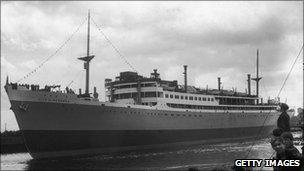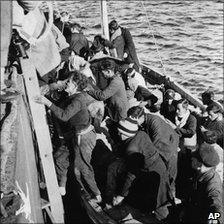Remembering the SS City of Benares tragedy 70 years on
- Published

The steam ship had left Liverpool on 13 September on its 2,500 mile voyage
Just before midnight on September 17 1940, the Bech children were among 100 evacuees on board the SS City of Benares, who were woken from their sleep by a German torpedo.
Minutes later Sonia and Derek were clinging to their mother in the North Atlantic, while their elder sister Barbara had disappeared down a rope that they prayed had led to a lifeboat.
Four days earlier they had set sail from Liverpool destined for Canada where they were to begin a new life - far away from deadly German bombs.
In the event they were the only entire family to survive a tragedy that would claim the lives of 87 children and 175 adults - and put an end to the short-lived policy of overseas evacuation.
The steam passenger ship was holed by the torpedo and sank in the early hours of 18 September, 600 miles off Ireland after its Royal Naval escort had deployed elsewhere.
It was one of the worst sea tragedies involving children of World War II.
The German U-48 submarine's repeated torpedo shots caused wide-scale panic and terror among the 400 passengers as lifeboats were launched and children and grown-ups scrambled for life jackets.
The evacuees, many of whom were travelling with their mothers, had ironically been selected for the voyage because of their vulnerability to bombing in their home towns and cities.
The Children's Overseas Reception Board, which had been set up just three months earlier to co-ordinate the evacuation of 210,000 British children to Canada, New Zealand and Australia, was disbanded following the tragedy.
"The idea was that by evacuating children out of the way it would somehow stiffen British resistance and we'd be much better equipped mentally and physically to face off a German invasion," explained Imperial War Museum historian Terry Chapman.
The Merseyside Maritime Museum estimates that 170,000 children were evacuated to the British Dominions or the US during World War II.
But the children on board the SS City of Benares never reached Canada.
Sonia said: "Little did we know at 10 o'clock that night that a U-boat had spotted us and was out for us."
"We rushed out onto the deck and the lifeboats had already been lowered into the sea which was very rough and we were on a sinking ship with no lifeboat and we wondered what was going to happen next."

Passengers survived in lifeboats and by clinging to rafts and wreckage
Barbara managed to climb a rope onto a lifeboat, while her mother, Sonia and Derek spent six hours in the Atlantic before being picked up by HMS Hurricane - but not before despair had set in.
Derek said: "Our mother told us 'let's just undo our lifebelts and we'll go to sleep in the water'."
It was Sonia who refused to let the family die and urged them to keep hoping until the Royal Navy lights appeared out of the dark.
Safely on board and recovering from hypothermia, they waited for news of Barbara.
Derek said: "My mother kept on calling 'has anyone seen Barbara?' A report came in that some people had died in their lifeboat and then another report came in that everybody had died in another boat.
"It went on and on and my mother was virtually giving up hope until in the last minute a sailor came down to my mother and said 'here's your Barbara'."
"The story of the sinking of the City of Benares is so important that everybody needs to be reminded of it from time to time," said Derek.
"It is one of those stories that never fades in the retelling and is a stark reminder to all of us of those dark days of the Second World War when terrible things happened to men, women and children."